Extreme hunger in Sub-Saharan Africa: Abiyot’s Story
Others, Child Poverty , HungerContributed by: Compassion Canada
This single mother of six struggles to keep her kids fed on an average day. With a pandemic in the mix, it’s been nearly impossible.
Written by: Laura Phillips
Today, if you were to look up how world hunger has been worsened by COVID-19, the reality would be sobering. You would see headline after headline talking about how the coronavirus pandemic is wreaking havoc on what was already a harsh reality for families living in low-income countries.
You would see that COVID-19-related hunger has been linked to 10,000 child deaths per month. You would be shocked by estimates that say, at a minimum, another 83-132 million may go hungry in 2020 as a result of the economic recession triggered by COVID-19.
You’d read that in order to avert a COVID-19 hunger crisis, $10 billion dollars is needed. You’d read that by the end of the year, 12,000 people per day could die from hunger linked to COVID-19.
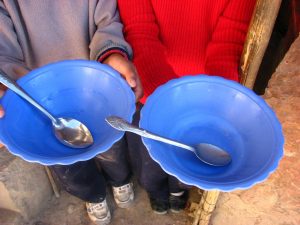
How do we possibly get our heads around these massive numbers?
It feels overwhelming to think about all the people who are in desperate need of something so essential to life. So overwhelming in fact, that perhaps we even grow numb to large numbers and statistics like these. Sometimes our hearts and our heads can’t compute such sorrow. It’s hard to see real, tangible faces in statistics.
But what if we saw just one person? One family. What would change? Would we feel compelled to act? Would we dare to move?
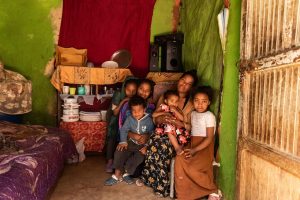
Single mother, Abiyot, in her home with 5 of her 6 children.
When Tsege, the director of a Compassion centre in Ethiopia, heard single mother of six, Abiyot’s story, she couldn’t help but act. From the moment Abiyot shared her struggles with Tsege, their lives were forever entangled. She could not help but move with compassion.
Abiyot’s story
One night in early April, on a crowded mattress in a small mud-plastered room, sat a mother slowly wiping her tears. In the dim moonlight that crept under her door, she could just make out the forms of her six children. Grief and love coursed through her at the sight. Even when she was surrounded by all her children, she was always reminded of the three who are missing. The three she had to give away two years ago because she was unable to provide for them. Silent tears coursed down her cheeks.
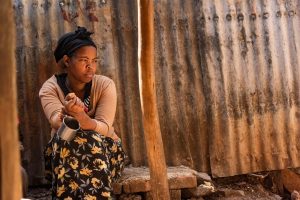
That night, she couldn’t silence the voice in her head enough for her to sleep. It was louder than the snoring and shallow breathing of her children. It was like there were two people in her head: one screaming the unthinkable, telling her to quit on life, and the other whispering to her to persevere. One magnified the bleak future ahead; the other gently counted her blessings and the possibilities of tomorrow.
Abiyot clung to the voice of life.
When she awoke the next morning, she had a new sense of hope. But it wasn’t long before the troubles from the days before rose with her, ready to torment her again. There was still nothing in the house to feed her children. She didn’t have money for bread. The youngest ones, age six, four and two, looked at her expectantly for breakfast. Their older siblings, 16, 12 and 10 years old, looked away. They understood.
“It was the most difficult thing I had to do. I felt defeated.”
The COVID-19 pandemic had destroyed the single mother’s financial situation.
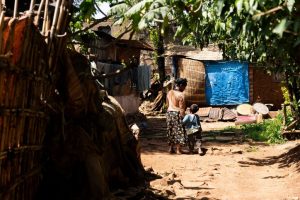
“My heart was broken when the school closed, and my part-time employers told me they don’t need my help anymore because of COVID-19. Every door was shut on my face,” says Abiyot.
And it wasn’t just her work that came to an abrupt stop, but the breakfast and lunches her children used to depend on through the government’s school feeding program.
“Even while I was working and my children were getting meals at school, I still struggled to feed them during weekends. I used to take leftover food from school for their dinner and the weekend. My husband abandoned us and remarried. I know how to take care of my children by myself if only I could work,” she says.
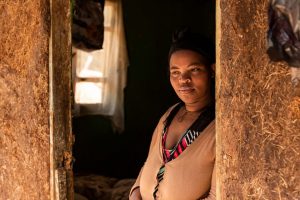
Abiyot is not alone.
She is one of the countless caregivers bearing the brunt of the financial impact of the COVID-19 pandemic. The health crisis, among other things, has presented an adverse impact on food security in households, as sources of income dry up, especially for those who rely on daily income.
Seen, heard and known
The eyes of her children followed Abiyot until she disappeared from their sight along the gravel path that leads to the main asphalt road. She was headed for the only place she knew to go for help—the Compassion centre that her four-year-old son, Habtemariam, had been attending since last August.
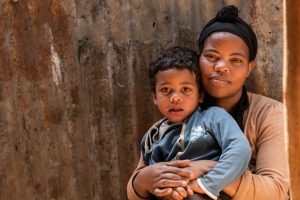
“Even if I knew I was doing the right thing by coming to the church, I couldn’t control my tears when I started telling Tsege, the centre director, the situation at home. It is the most difficult thing I have had to do. I felt defeated,” says Abiyot.
Having served children at the Compassion centre for more than 10 years, Tsege has helped many overcome their struggles and encouraged them to see a better future.
“I clearly see why God brought us to the church. Where would have I gone for help?”
She has heard many stories of broken homes, broken hopes and broken dreams. But nothing moves her more than a mother who is unable to feed her children.
“I knew the struggle Abiyot faced even before the health crisis,” says Tsege. “When she came and told me that she had nothing to feed her children that day, I was heartbroken. I collected money from the staff and myself so she could go buy food for the children immediately until I consulted with our program facilitator and decided how best to help her.”
That day, Abiyot’s children enjoyed the food their mother brought back.

While her children were joyfully eating, Abiyot couldn’t help but wonder what tomorrow and the days to come would bring. Soon after, Tsege asked her to come back to the church. On that day, a nervous Abiyot arrived much earlier than instructed. She could not wait to hear the outcome of their discussions.
Life-changing news
The news made the family shout with joy.
Compassion’s church partner would provide 3000 ETB (CAD $155) worth of food for the family immediately, plus long-term assistance to cover the costs of groceries and the family’s rent until the COVID-19 crisis is over.
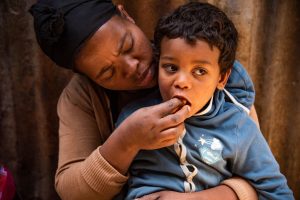
Abiyot’s daughter, Etsub, scooped up her brother Habtemariam, threw him into the air and caught him. “Thank God you were born!” she cried. “It is because of you that we have food in the house.”
The children lined up excitedly when their mother and the centre staff brought in 60 kilograms of Teff flour so they could make injera (a local staple), Shiro flour (a mixture of pea and chickpea flour) for stew, and cooking oil. This was enough to last the family for two months.
“They have rescued my children from hunger,” says Abiyot. “They are the reasons I didn’t grumble against God, but they were my reason to give thanks to Him. I clearly see why God brought us to the church. Where would have I gone for help?”
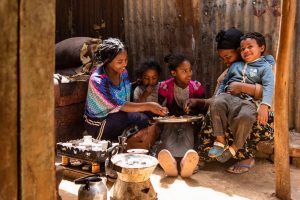
Centre director Tsege worries for the caregivers who call and tell her their struggles. If she is already receiving reports of families struggling this early in the pandemic, she fears for what will happen if they cannot work again soon.
To better prepare for the future, Tsege and the project staff frequently correspond with their program facilitator and the church leadership to identify families who will be hit the hardest if the health crisis doesn’t resolve soon. Until then, they continue to respond to exceptional cases like Abiyot’s as best they can with the resources they have.
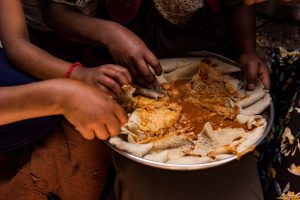
The family enjoys a plate of injera and Shiro stew.
The night the project brought in the food supply, Abioyt slept peacefully. The only thought that filled her mind was the assurance of the breakfast, lunch and dinner she would happily serve her children when they woke tomorrow, and for the many days to come.
Words by Tigist Gizachew and Laura Phillips
Photos by Tigist Gizachew
Originally published on: https://www.compassion.ca/blog/extreme-hunger-in-sub-saharan-africa-abiyots-story/

